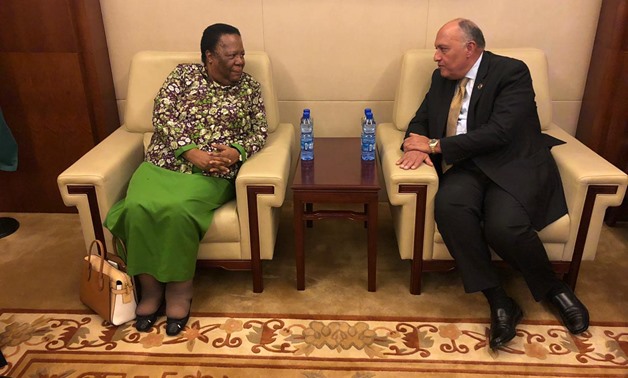
Egyptian Foreign Minister Sameh Shoukry meets with his South African counterpart Naledi Pandor on the sidelines of the 36th session of the Executive Council of the African Union in Addis Ababa on February 7, 2020- press photo
CAIRO - 7 February 2020: On the sidelines of the 36th session of the Executive Council of the African Union in Addis Ababa, Egyptian Foreign Minister Sameh Shoukry discussed with his South African counterpart Naledi Pandor the latest development of tripartite consultation between Egypt, Sudan, and Ethiopia on the Grand Ethiopian Renaissance Dam (GERD).
The Egyptian Foreign Minister reviewed the current situation and Egypt’s positive engagement and its good faith in the negotiation to reach a fair agreement on filling and operating the dam, so that it would achieve Ethiopia's development goals without causing harm to Egypt's water interests, said Egyptian Foreign Ministry Spokesperson Ahemd Hafez in a statement on Friday.
The meeting also tackled the bilateral relations between two countries and the mutual cooperation in AU topics, atop of which the AU Peace Fund, Hafez continued.
On January 12, 2020, Ethiopian Prime Minister Abiy Ahmed announced that he asked South African President Cyril Ramaphosa to mediate to find solutions to the disagreement between the three countries as South African will chair the AU this year.
After a four-day negotiation in Washington D.C on January 28-31, the three countries reached an agreement on only three points of contention regarding the construction of the controversial dam.
They agreed on a schedule that includes a plan for filling Dam in stages, and on mechanisms for dealing with droughts, prolonged droughts, and years of water scarcity during the process of filling the dam, and during the dam operation.
The US drafted a document of agreement regarding the three above-mentioned points and was unilaterally signed by Egypt.
The difference between the three Nile basin countries dates back to May 2011 when Ethiopia started building the dam; Egypt voiced concern over its water share [55.5 billion cubic meters]. Three years later, a series of tripartite talks between the two countries along with Sudan began to reach an agreement while Ethiopia continued the dam construction.
In 2015, the three countries signed the Declaration of Principles, per which the downstream countries [Egypt and Sudan] should not be negatively affected by the construction of the dam. Since then, the talks have been resumed, but In October 2019 blamed Addis Ababa for hindering a final agreement concerning a technical problem, calling for activating the Article No. 10 of the Declaration of Principles, which stipulates that if the three countries could not find a solution to these differences, they have to ask for mediation.
Additional reporting by

Comments
Leave a Comment